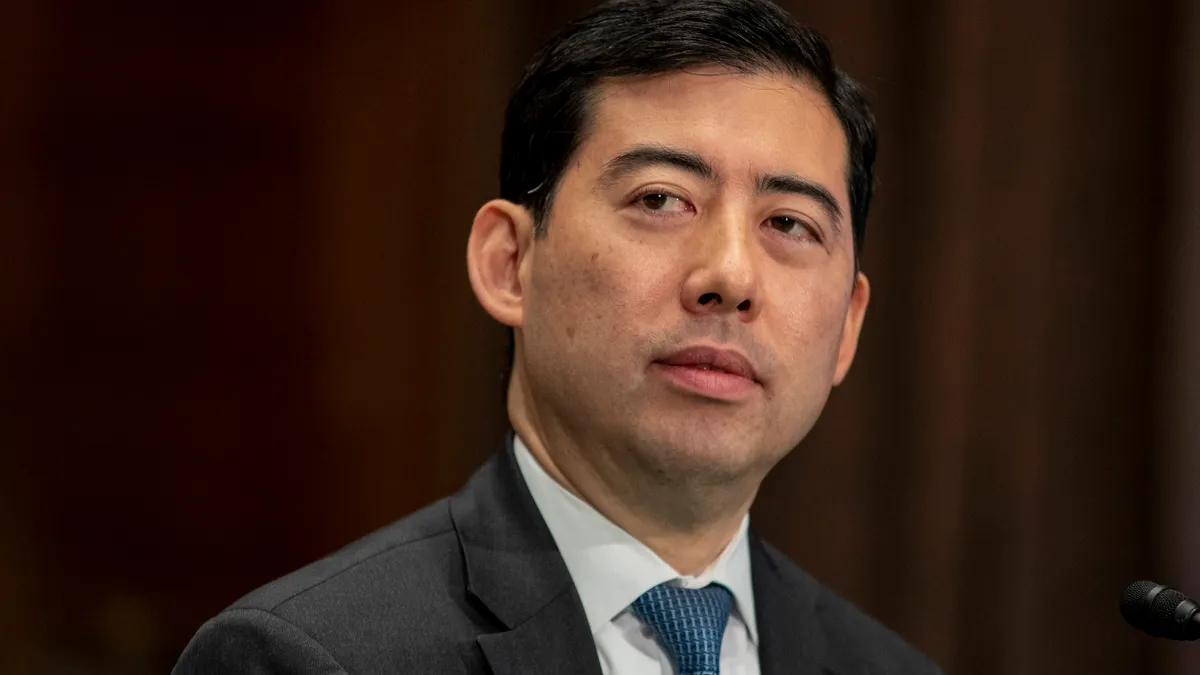Dive Brief:
- President Donald Trump appointed Securities and Exchange Commissioner Mark Uyeda, a Republican, to serve as acting chairman of the agency, among other federal appointments, shortly after being sworn in for his second term as president Monday, according to a Jan. 20 memo by the White House.
- Uyeda’s appointment as acting chair follows after Chair Gary Gensler officially departed from his role Monday, after announcing his intent to leave in late November. Uyeda will likely serve as acting chair until Trump’s nominee for Gensler’s successor, Paul Atkins, completes his Senate confirmation process.
- “Although as Commissioners we approached policy issues from different perspectives, there was always dignity in our differences,” Uyeda said in a joint statement Monday together with commissioners Hester Peirce and Caroline Crenshaw regarding Gensler’s departure. “Chair Gensler has been committed to bipartisan engagement and a respectful exchange of ideas, which has helped facilitate our service to the American public. For that we are deeply grateful.”
Dive Insight:
A 15-year veteran of the SEC, Uyeda was sworn in for his first term as an SEC commissioner in June 2022, and was confirmed for his second term the following December, according to a biography posted on the agency’s website.
He will be assuming his duties as acting chair as the SEC sees an exodus of top leadership in the early days of Trump’s second term; as well as Gensler, Chief Economist Jessica Wachter and General Counsel Megan Barbero have also departed their roles at the agency, while Chief Accountant Paul Munter is set to depart on Jan. 24, CFO Dive previously reported.
It’s not unusual for such changes to take place as new administrations come into effect, Michael Bachner, a partner at the firm Bachner & Associates previously told CFO Dive.
However, both the exodus and Trump’s choices of Uyeda and Atkins as leaders at the agency likely signal a coming shift in strategy and enforcement at the SEC and related agencies — especially when it comes to the SEC’s approach to highly politicized areas including cybersecurity, climate change, and cryptocurrency. During his tenure as SEC chair, Gensler was often lambasted by Republican leadership for strict oversight in areas like cryptocurrency — a space where both Uyeda and Atkins have advocated for a more business-friendly approach.
Together with fellow commissioner Peirce, Uyeda has been a dissenting voice during key decisions by the SEC surrounding cryptocurrency under Gensler’s tenure. Trump, for his part, also signaled his administration would have a softer hand regarding crypto during the campaign trail and has enjoyed strong support from industry advocates.
Both Uyeda and Peirce, for example, disagreed with a December 2023 decision by the agency to deny a petition by crypto exchange platform Coinbase to add crypto to its rulemaking agenda. The petition concerned an ongoing point of legal contention between the crypto space and the agency — whether crypto assets can be counted as securities and therefore, are subject to regulation by the SEC.
“In our view, the Petition raises issues presented by new technologies and other innovations, and addressing these important issues is a core part of being a responsible regulator,” the commissioners wrote in their dissent.
The SEC has continued to tussle with Coinbase; in June 2023, the agency filed an ongoing suit against the exchange, alleging it was operating an illegal securities exchange. Earlier this month, a federal judge granted Coinbase an interlocutory appeal in the case, reigniting the issue of crypto’s classification and the SEC’s authority to regulate it, Industry Dive sister publication Banking Dive previously reported.
Uyeda has already taken steps to reverse the SEC’s stance on crypto under Gensler; on Tuesday, he announced the formation of a “crypto task force” aimed at “developing a comprehensive and clear regulatory framework for crypto assets,” according to a press release. Peirce will lead the task force.
“To date, the SEC has relied primarily on enforcement actions to regulate crypto retroactively and reactively, often adopting novel and untested legal interpretations along the way,” the Tuesday press release reads. “Clarity regarding who must register, and practical solutions for those seeking to register, have been elusive. The result has been confusion about what is legal, which creates an environment hostile to innovation and conducive to fraud. The SEC can do better.”
The moves follow after Trump enjoyed strong support from cryptocurrency businesses and advocates in the runup to his election and inauguration, with the president pledging to create a national reserve of Bitcoin on the campaign trail and designating Craft Ventures partner David Sacks as “White House AI and Crypto Czar” at the top of December, among other actions, according to reports.
Some advocates are already rethinking such support after an anticipated flurry of executive orders targeting the crypto space failed to materialize during Trump’s first day in office, according to a Bloomberg report.
Others have criticized the choice by the president and first lady to launch a crypto “meme” coin days before Trump’s inauguration — arguing both that the decision undermines the industry’s credibility and that it represents a clear conflict of interest, with the president both setting crypto policy and benefiting from the coin’s success, The Wall Street Journal reported Tuesday.
Trump also appointed new chairs or acting chairs for several other federal agencies, including tapping Andrew Ferguson as chair of the Federal Trade Commission, according to the Monday release.












